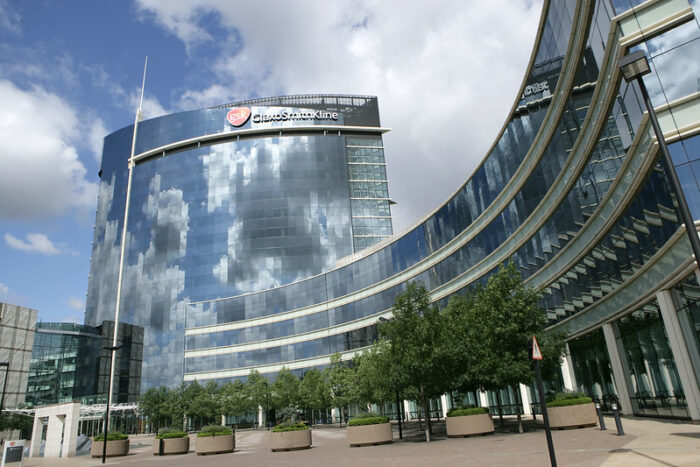
An Arrowhead Pharmaceuticals “gene-silencing” drug candidate for the fatty liver disease nonalcoholic steatohepatitis (NASH) is ready for the next stage of clinical testing, and it will take that step in the hands of GlaxoSmithKline. The pharmaceutical giant has agreed to pay $120 million up front for rights to Arrowhead’s therapeutic candidate in a bet that its approach to a novel disease target can stand out in a field of drug research marred by numerous setbacks.
The deal, announced after the market close on Monday, gives GSK rights to develop and commercialize the Arrowhead drug, ARO-HSD. Those exclusive rights span the globe, with the exception of China, where Arrowhead retains rights. Milestone payments could bring the biotech as much as $910 million more, a sizable upside that represents the size of the therapeutic opportunity.
NASH, a fatty liver disease that has grown in prevalence in tandem with poor eating habits, has no FDA-approved therapies. The buildup in fat can progress to liver scarring; in the most serious cases, patients must undergo an organ transplant. According to the American Liver Foundation, NASH is the most common chronic liver condition in the U.S., affecting an estimated 25% of adults in the country.
Pasadena, California-based Arowhead develops drugs based on RNA interference (RNAi), a class of therapies made from small interfering RNA. These drugs stop the RNA needed for a gene to produce a disease-causing protein, an approach sometimes called gene silencing. Alnylam Pharmaceuticals won the first FDA approval of an RNAi drug in 2018, a treatment for nerve pain caused by a rare inherited disorder. Arrowhead’s NASH drug, ARO-HSD, targets HSD17B13, an enzyme involved in the metabolism of hormones, fatty acids, and bile acids. Research has indicated that stopping the enzyme can protect against liver conditions, including NASH.
At the annual meeting of the American Association for the Study of Liver Disease earlier this month, Arrowhead reported Phase 1 data showing that its drug led to reductions in messenger RNA and HSD17B13. The reductions were dose dependent and at the highest of the three doses, the reductions in mRNA were greater than 90%. Levels of HSD17B13 were reduced at all doses, and the drug led to decreases in two key liver enzymes at the middle and high doses. The Arrowhead therapy was well tolerated by patients and no serious adverse events were reported.

A Deep-dive Into Specialty Pharma
A specialty drug is a class of prescription medications used to treat complex, chronic or rare medical conditions. Although this classification was originally intended to define the treatment of rare, also termed “orphan” diseases, affecting fewer than 200,000 people in the US, more recently, specialty drugs have emerged as the cornerstone of treatment for chronic and complex diseases such as cancer, autoimmune conditions, diabetes, hepatitis C, and HIV/AIDS.
In a prepared statement, John Lepore, GSK’s head of research, said the evidence linking HSD17B13 variants to protection of the liver from inflammation suggests an opportunity for the Arrowhead drug to become a first-in-class therapy for NASH. Speaking on a conference call, Arrowhead CEO Chris Anzalone said the GSK deal enables Arrowhead to take the capital it would have spent on developing ARO-HSD and apply it to programs the biotech may commercialize itself.
GSK is Arrowhead’s second NASH partner. Johnson & Johnson subsidiary Janssen is developing a NASH candidate developed with Arrowhead’s RNAi technology. That drug, JNJ-75220795, is designed to reduce expression of PNPLA3, a different liver enzyme that has preclinical validation for driving liver fat accumulation and damage. The Janssen drug is currently in Phase 1 testing.
While the unmet medical need in NASH is attractive to drug developers, the field has had several high-profile stumbles. A Gilead Sciences NASH drug candidate failed a Phase 3 study in 2019. Last year, Genfit’s NASH drug candidate failed its pivotal test. That setback was followed by the FDA’s rejection of an Intercept Pharmaceuticals drug that was once viewed as the frontrunner to become the first approved NASH therapy. A clinical hold placed on tests of a Cymabay Therapeutics NASH drug candidate was cleared last year. But when Cymabay resumed clinical testing, the company did not continue in NASH and opted instead to continue tests of the drug in a rare liver disease.
The setbacks haven’t dissuaded companies from NASH drug development. Gilead is still testing therapies for the disorder under a partnership with Novo Nordisk. Other companies with mid-to-late-stage NASH drug candidates include Madrigal Pharmaceuticals, Viking Therapeutics, Akero, and 89Bio. According to Anzalone, the partnering process for Arrowhead’s NASH drug was competitive. Though he did not offer details he said J&J’s ongoing NASH alliance with Arrowhead did not give it any preferential access to ARO-HSD.
“We spoke with a number of companies about the asset and GSK seemed to be the best partner,” Anzalone said. “J&J did not have a right of first refusal or anything like that for [ARO-HSD].”
Arrowhead has several partnerships with larger companies in a range of therapeutic areas. Besides NASH, the Janssen alliance includes chronic hepatitis B virus infection. Amgen is developing an Arrowhead RNAi therapy for cardiovascular disease. Last year, Takeda Pharmaceutical paid $300 million up front to begin a collaboration on an Arrowhead drug for a rare liver disorder. And earlier this year, Horizon paid $40 million up front for the rights to develop an Arrowhead RNAi therapy for gout.
The Arrowhead/GSK deal follows the announcement last week that Novo Nordisk will acquire its RNAi R&D partner Dicerna Pharma for $3.3 billion. Anzalone said Arrowhead hasn’t seen a recent increase in partnering interest, adding that recent acquisitions in the space do not affect how the biotech does day-to-day business.
“Our job is to make medicines that are safe and that can help patients in ways that other medicines can’t,” Anzalone said. “To the extent that we can focus on that, and we can succeed at that, and we can do that rapidly, everything else will sort of follow.”
Photo by GlaxoSmithKline












